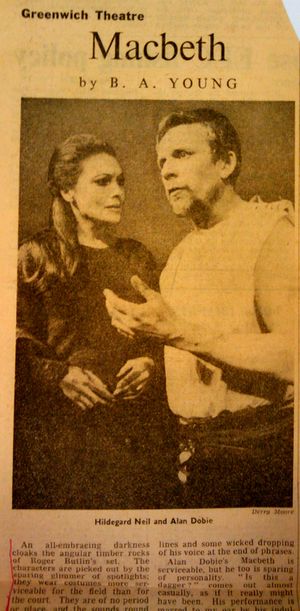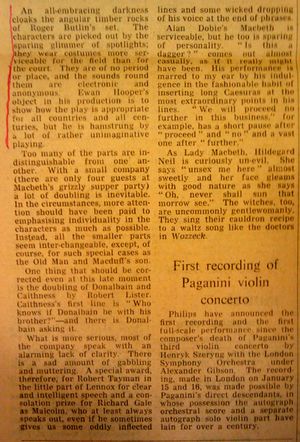DD140920
From WikiDelia
Jump to navigationJump to searchDD140920 and DD140944 are shots of a newspaper clipping of a review by B. A. Young of Macbeth (1971), showing a photograph by Derry Moore of the principal two actors, Hildegard Neil and Alan Dobie.
Transcript
An all-embracing darkness cloaks the angular timber rocks of Roger Butlin's set. The characters are picked out by the sparing glimmer of spotlights; they wear costumes more ser- viceable for the field than for the court. They are of no period or place, and the sounds round them are electronic and anonymous. Ewan Hooper's object in his production is to show how the play is appropriate for all countries and all cen- turies, but he is hamstrung by a lot of rather unimaginative playing. Too many of the parts are in- distinguishable from one an- other. With a small company (there are only four guests at Macbeth's grizzly supper party) a lot of doubling is inevitable. In the circumstances more atten- tion should have been paid to emphasising individuality in the characters as much as possible. Instead, all the smaller parts seem interchangeable, except, of course, for such special cases as the Old Man and Macduff's son. One thing that should be cor- rected even at this late moment is the doubling of Donalbain and Caithness by Robert Lister. Caithness's first line is "Who knows if Donalbain be with his brother?"--and there is Donal- bain asking it. What is more serious, most of the company speak with an alarming lack of clarity. There is a sad amount of gabbling and muttering. A special award, therefore, for Robert Tayman in the little part of Lennox for clear and intelligent speech and a con- solation prize for Richard Gale as Malcolm, who at least always speaks out, even if he sometimes gives us some oddly inflected ----------------------------------- lines and some wicked dropping of his voice at the end of phrases. Alan Dobie's Macbeth is serviceable, but he too is sparing of personality. "Is this a dagger?" comes out almost casually, as if it really might have been. His performance is marred to my ear by his indul- gence in the fashionable habit of inserting long Ceasuras at the most extraordinary points in his lines. "We will proceed no further in this business," for example, has a short pause after "proceed" and "no" and a vast one after "further". As Lady Macbeth, Hildegard Neil is curiously un-evil. She says "unsex me here" almost sweetly and her face gleams with good nature as she says "Oh, never shall sun that morrow see." The witches, too, are uncommonly gentlewomanly. They sing their cauldron recipe to a waltz song like the doctors in Wozzeck.

